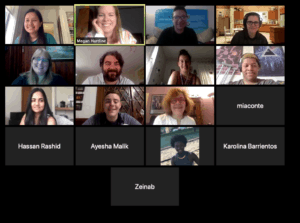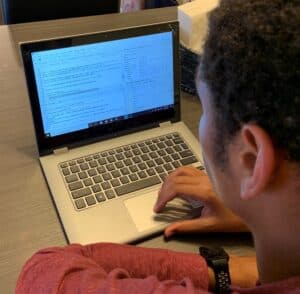
In most years, more than 100 Trinity students participate in on-campus summer research, working on projects with faculty members across a variety of disciplines. This summer, however, students and faculty were confronted with the question of how to conduct research together over long distances during the COVID-19 pandemic. Faculty, staff, community partners, and 86 Trinity students have persisted by finding solutions to the challenges of remote research, and they continue to see the importance of these outside-of-the-classroom summer experiences.
The Trinity Summer Research Program (SRP) supports research across academic fields, including the natural sciences, social sciences, arts, and humanities. One component of the program is the Public Humanities Collaborative (PHC), which is funded by a grant from the Andrew W. Mellon Foundation and is run by Director of Community Learning Megan Hartline. “Students work on two projects: they work on a research project with a faculty member, and they work on a public facing project with a community partner. Through these dual projects, students get a multidimensional experience in the academic side of the humanities,” Hartline said.
The PHC exposes students to what their work might be like if they were to pursue a Ph.D. in a humanities field, as well as what working with various organizations such as museums, archives, and historical societies entails. Students work approximately 15 hours a week with faculty on their humanities-oriented scholarship, such as journal articles or book chapters, and another 15 hours a week with Hartford humanities partners on public humanities projects, such as an oral history collection, interactive website, community discussion, exhibit, or public performance. Hartline added, “Humanities research and project-based work is everywhere, and so we are trying to give students an understanding of what is available to them in this kind of work once they finish at Trinity.”
Kyrè William-Smith ’21, a student researcher in the PHC, is helping Associate Professor of History Jennifer Regan-Lefebvre edit and complete her book about food, wine, and world history. “As an English major, this research gave me a chance to see the editing and publishing process,” said William-Smith. “I have read over Professor Regan-Lefebvre’s proposals she sent to publishers, read over their responses, and read over critics’ responses to her project. Now I have an idea of what it is like to publish, since I would someday like to publish myself.” William-Smith also is working with the Webb-Deane-Stevens (WDS) Museum to update its website to better display ticket sales, teaching information, and posters. Since he cannot physically work in the museum, William-Smith has learned how best to use his computer for research and information organization to help improve the quality of the website. The work William-Smith has done with Regan-Lefebvre and with the WDS Museum has introduced him to a possible career path in publishing and has helped him create connections with humanities resources in Connecticut.

Within the science side of the Summer Research Program, biology and environmental science double major Stephen Tyler ’21 is working with Assistant Professor of Biology Benjamin Toscano. Tyler and Toscano are conducting ecology research, which Tyler said has been especially relevant to him because he would like to get his master’s degree in either ecology or wildlife biology and management. Tyler has not been able to work in person with Toscano because of COVID-19; instead, he has worked on designing experiments that Toscano hopes can be conducted in the fall. To design those experiments, Tyler has been doing literature reviews and brainstorming experimental design. In addition, he has sharpened his coding skills within the software R, which will be a useful tool for Tyler as he continues his biology studies beyond Trinity. Tyler said that not being on campus with his professor has forced him to take initiative. “I have to motivate myself more,” he said. Tyler has found that making daily to-do lists and picking certain times in the day to work has given him the structure he needs to be successful.
Hartline said she has seen the same intrinsic drive and motivation that Tyler described. “When I think about what folks are getting [from their summer research], I think more about the resilience everyone has shown and the willingness to be flexible. And that’s everyone—that’s our faculty, our community partners, and especially our students,” Hartline said. “There has been this incredible willingness to make things work.” She said problems that once seemed to be large roadblocks are now small hurdles because of the perspective remote work has given them. Challenges with technology and communication have brought students and faculty closer because they can work through the unprecedented problems together.
Before COVID-19, students and faculty would work face to face during the summer, often having lunch with other student researchers and faculty to collaborate and learn. Although conversations over Zoom cannot replace in-person learning, students and faculty have found new ways to connect and to teach that can be utilized even after they are able to return to work together in the lab or classroom. Toscano said that one way he is able to connect with students remotely is through carrying out all the usual steps of a lab procedure, except for data collection. Toscano and Tyler’s remote research has demonstrated that learning and collaborating is still possible, even when not in person. In addition, Toscano emphasized the transformational power of working with and mentoring students in research so that they can foster creative thinking and problem-solving skills.
To learn more about Trinity’s Summer Research Program, click here. For more information about the Public Humanities Collaborative, click here.
